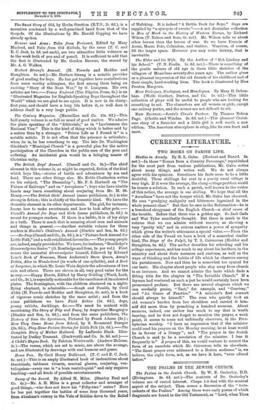CURRENT LITERATURE.
TWO BOOKS ON PARISH LIFE.
Studies in Arcady. By R. L. Gales. (Herbert and Daniel. 5s. net.)-In these "Essays from a Country Parsonage," republished for the most part from various publications, Mr. Gales writes about many things, and writes well. We do not always agree with his opinions. Sometimes his facts seem to be a little doubtful. Three shillings for rent in a purely rural village is very high. If it were the average, the cheap cottage problem would be nearer a solution. In such a parish, well known to the writer of this notice, the average is one shilling. We hope that all the "Arcadians" have not the temper which Mr. Gales has observed. He sees "grudging malignity and bitterness ingrained in the whole peasant class." But then he sees in the Reformation-he is a beneficed clergyman of the English Church-a chief cause of the trouble. Before that there was a golden age. So Jack Cade and Wat Tyler manifestly thought. But there is much in the volume that we can admire without reserve, as showing a very "pretty wit," and in serious matters a power of sympathy which gives the writer's utterances a special value.-From the other side of the Tweed we have a book of a somewhat similar kind, The Steps of the Pulpit, by T. S. Cairncross (Hodder and Stoughton, 3s. 6d.) The author describes his schooling and his college experiences, and has much to say about his brethren in the ministry and about their manners and customs, as well as the ways of thinking and the habits of life which he observes among his parishioners. Now and then he is somewhat too cynical for our taste. His chapter about people who stay away from church is an instance. And we cannot admire the taste which finds a fitting title for the chapter in "The Invisible Church." If a layman had ventured on such a jest he would certainly have been pronounced profane. But there are several chapters which we can cordially praise, "Tact," for example, and "Courtesy," and "An Ounce of Practice." "A minister's first convert should always be himself." The man who quietly took an old woman's burden from her shoulders and carried it him- self did more than by preaching a hundred sermons. About sermons, indeed, our author has much to say that is worth hearing, and he does not forget to mention the prayer, a weak point, it seems to some not unfriendly observers, in the Pres- byterian worship. "I have an impression that if the minister could read his prayers on the Monday morning, he at least would be in favour of a liturgy"; and "The prayer in the Scotch Church is said to be a revelation of the minister. I fear it frequently is." A propos of this, we would venture to correct the form of an anecdote which Mr. Cairncross tells us elsewhere. "The finest prayer ever addressed to a Boston audience" is, we believe, the right form, not, as we have it here, "ever offered before."










































































 Previous page
Previous page